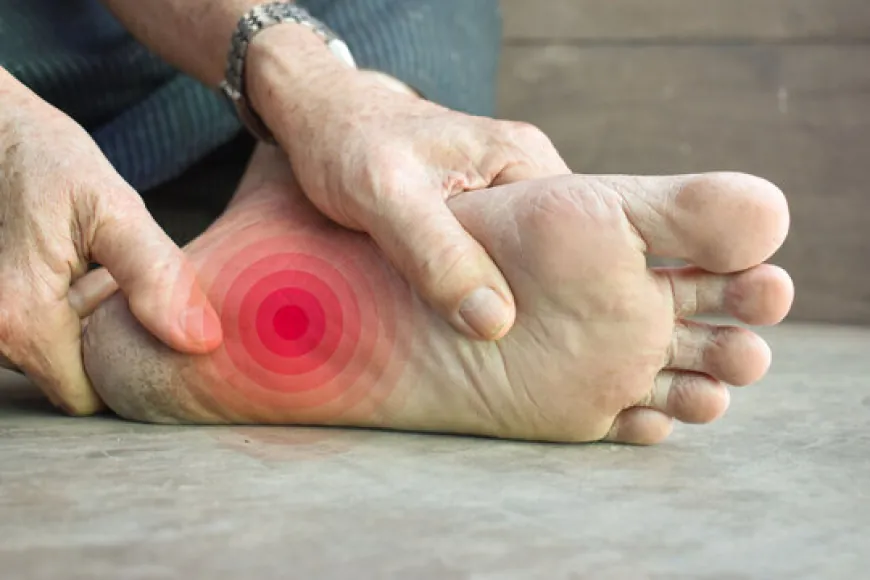Peripheral Neuropathy: Symptoms, Causes, and Treatment
Learn about peripheral neuropathy, its symptoms, causes, and treatment options. Discover how to manage nerve pain and improve your quality of life.

A condition affecting millions worldwide, peripheral neuropathy often leads to discomfort, pain, and loss of function in various parts of the body. It occurs when the peripheral nerves, which connect the central nervous system to the rest of the body, become damaged or disrupted.
These nerves are responsible for transmitting signals that control movement, sensation, and organ function. If left untreated, neuropathy can lead to serious complications, especially for individuals with underlying conditions like diabetes.
What is Peripheral Neuropathy?
The human nervous system is divided into two parts: the central nervous system (CNS) and the peripheral nervous system (PNS). While the CNS, consisting of the brain and spinal cord, controls major bodily functions, the PNS connects the CNS to muscles, organs, and other areas.
It refers to damage in these peripheral nerves, disrupting communication between the brain and the rest of the body.
There are different types of neuropathy. Sensory neuropathy affects sensations such as pain, temperature, and touch, while motor neuropathy impacts muscle movement.
Lastly, autonomic neuropathy affects involuntary functions like heart rate, digestion, and bladder control. Understanding the type of neuropathy a person has is crucial for proper diagnosis and treatment.
Common Causes of Peripheral Neuropathy
There are numerous potential causes of neuropathy, each with varying degrees of severity. Identifying the cause is essential to formulating an appropriate treatment plan.
1. Diabetes
The most common cause is diabetes. Elevated blood sugar levels can damage nerves over time, resulting in a condition known as diabetic neuropathy. Diabetics are particularly vulnerable to nerve damage in their legs and feet, often leading to pain, numbness, or even ulcers if left untreated.
2. Infections
Certain infections can lead to peripheral neuropathy. Viral infections such as HIV, shingles, and Lyme disease have been linked to nerve damage. Bacterial infections, if not treated promptly, can also cause inflammation in the nerves, leading to permanent damage.
3. Physical Trauma or Injury
Direct injury or trauma, such as fractures, car accidents, or surgical complications, can result in nerve damage. When nerves are compressed or severed, they can lose the ability to transmit signals effectively, resulting in neuropathy.
4. Toxins and Medications
Exposure to toxic substances like alcohol, heavy metals, or certain chemicals can impair nerve function. Additionally, some medications, particularly those used in chemotherapy, can have side effects that cause neuropathy.
5. Autoimmune Diseases
Conditions like lupus or rheumatoid arthritis can cause the immune system to attack peripheral nerves, leading to chronic inflammation and nerve damage.
6. Vitamin Deficiencies
Lack of essential vitamins, particularly B12, can lead to nerve degeneration. Vitamin deficiencies are commonly seen in people with poor diets, alcohol dependency, or certain gastrointestinal disorders.
Recognizing the Symptoms
Recognizing the symptoms of peripheral neuropathy early on can prevent further complications and damage. The symptoms can vary depending on the type of nerve affected and the severity of the damage.
1. Early Symptoms
Initially, people may experience mild tingling or numbness in their hands and feet. This sensation may come and go and is often mistaken for temporary discomfort caused by poor posture or minor injuries. However, if the numbness persists or worsens, it can be a sign of early neuropathy.
2. Progressive Symptoms
As the condition progresses, the tingling and numbness may spread to other areas of the body. Many people with neuropathy report feeling sharp, stabbing pains or burning sensations, particularly at night. Muscle weakness is another common symptom, making it difficult to perform everyday tasks like gripping objects or walking.
3. Impact on Daily Life
For some, the symptoms become debilitating, affecting their quality of life. Simple tasks like standing, walking, or writing can become painful and challenging. The lack of coordination and balance may also increase the risk of falls and injuries, further complicating daily life.
Diagnosis of Neuropathy
Diagnosing neuropathy involves several steps to determine the underlying cause and extent of nerve damage. A comprehensive approach to diagnosis helps ensure accurate treatment.
1. Medical History
Doctors begin by reviewing a patient's medical history to identify any conditions or lifestyle factors that could contribute to nerve damage. Diabetes, alcohol use, and exposure to toxins are some of the common risk factors considered.
2. Physical Examination
A thorough physical examination, including a neurological assessment, helps to identify areas of weakness, numbness, or reduced reflexes. Doctors often test the patient's sensitivity to temperature, vibration, and touch to determine the extent of sensory damage.
3. Diagnostic Tests
To confirm a diagnosis, doctors may perform diagnostic tests such as nerve conduction studies, which measure the speed of nerve signals, and electromyography (EMG), which assesses muscle and nerve function. Blood tests may also be ordered to check for underlying conditions like vitamin deficiencies or infections.
Treatment Options
Although there is no cure for neuropathy, there are various treatment options available to manage symptoms, improve quality of life, and slow the progression of the condition.
1. Medications
Pain relief is often the first line of defense. Over-the-counter medications like ibuprofen or acetaminophen may help, but prescription medications, such as gabapentin or pregabalin, are often more effective for neuropathic pain. Some patients may also benefit from topical treatments, such as lidocaine patches or capsaicin cream.
2. Physical Therapy
Physical therapy plays an important role in managing the muscle weakness associated with peripheral neuropathy. Therapists can design personalized exercise programs to improve balance, strength, and coordination, helping patients maintain mobility and reduce the risk of falls.
3. Alternative Therapies
Some people find relief through alternative therapies like acupuncture, massage therapy, or biofeedback. While more research is needed to confirm their effectiveness, these therapies can help manage pain and reduce stress, which may improve overall well-being.
4. Lifestyle Changes
Addressing underlying conditions is crucial for managing neuropathy. For diabetics, controlling blood sugar levels through diet, exercise, and medication is essential. Ensuring a balanced diet with adequate vitamins and avoiding alcohol and toxins can also support nerve health.
5. Surgical Options
In cases where nerve compression is the cause, surgery may be recommended. For example, carpal tunnel syndrome, a common cause of neuropathy in the hands, can often be treated surgically by relieving pressure on the affected nerves.
Conclusion
Peripheral neuropathy is a complex condition that can significantly impact a person’s quality of life. Early diagnosis and treatment are essential for managing symptoms and preventing further nerve damage.
While there is no cure, a combination of medications, therapies, and lifestyle changes can provide relief and improve overall well-being. If you suspect you have such neuropathy, seeking medical advice is the first step toward managing this condition and preventing long-term complications.
What's Your Reaction?
 Like
0
Like
0
 Dislike
0
Dislike
0
 Love
0
Love
0
 Funny
0
Funny
0
 Angry
0
Angry
0
 Sad
0
Sad
0
 Wow
0
Wow
0






















































